“Dagger of the Mind”
Written by S. Bar-David
Directed by Vincent McEveety
Season 1, Episode 10
Production episode 6149-11
Original air date: November 3, 1966
Stardate: 2715.1
Captain’s log. The Enterprise is beaming stuff down to Dr. Tristan Adams on the Tantalus Penal Colony. The transporter operator fails his saving roll versus doofus and forgets that penal colonies have shielding. They beam the stuff down and then beam up a box labeled “CLASSIFIED MATERIAL: DO NOT OPEN.” It contains a person: Dr. Simon Van Gelder, who knocks out the transporter operator and takes his clothes. However, Tantalus alerts the Enterprise to a violent criminal who escaped the penal colony. Despite the security alert, Van Gelder makes it to the bridge, pointing a phaser, begging for asylum. He’s only willing to put the weapon down if Kirk promises not to take him back to Tantalus. Kirk not only refuses to promise such a thing, he and Spock manage to subdue Van Gelder.
He’s ranting and raving, bouncing from subject to subject, to the point where McCoy has to sedate him. He also claims to be an administrator at Tantalus, and to Kirk’s surprise, Spock verifies that Van Gelder is a doctor who was assigned to Tantalus as Adams’s associate. Adams claims that Van Gelder tested a new neural beam on himself and it went horribly wrong. McCoy’s not buying it, and he enters a doubt in his medical log that Kirk has to answer in his log, so Kirk is forced to perform an investigation.
Adams is fine with that. He’s done a great deal to revolutionize prisons, to the point where they’re more like hospitals for sick minds than cages, and Kirk is giving him the benefit of the doubt way more than McCoy is. Kirk beams down to Tantalus along with ship’s psychiatrist Dr. Helen Noel. Kirk and Noel apparently have a history from the science lab Christmas party (wah-HEY!), and Kirk is grumpy about her assignment.
They beam down and go down a really really fast turbolift deep underground to the Tantalus facility. They’re greeted by Adams, who pours a drink for a toast to visitors. Kirk and Noel meet Lethe, a criminal who was sent to Tantalus and became a therapist after her sentence ended. She’s very monotone and seems to speak in prepared sentences.
On the Enterprise, Spock and McCoy continue to try to get straight answers out of the shattered remains of Van Gelder’s brain meats. He does mention a neural neutralizer—and down on Tantalus, Van Gelder is showing Kirk and Noel the neural neutralizer. Adams says that the tranquilizing effects of the neutralizer are temporary, but they are sometimes useful with the harder cases.
Once Kirk, Noel, and Adams leave, the neutralizer is used to force a patient to forget anything he’s heard. Spock and McCoy check in with concerns about the neutralizer based on Van Gelder’s ravings, but Kirk and Noel believe Adams’s assertions that Van Gelder made his own mess. When Kirk says he and Noel will stay the night, Van Gelder loses his shit, convinced that they’ll die if they stay.
Spock performs a Vulcan mind-meld to try to make sense out of Van Gelder’s lunacy. Spock’s mind proves a calming influence on Van Gelder, who explains that Adams uses the neutralizer to alter people’s memories. (So it’s like the flashy thing in Men in Black, only they need a whole room for it instead of a pen….)
Kirk decides he wants to see the neutralizer in action without any of Adams’s staff around. Noel operates the controls. She turns it on for a second, and Kirk goes blank and then loses that second. Next Noel turns it on and suggests that Kirk’s hungry. When she turns it off, he goes on about how he’s starving. Kirk suggests something more significant, that they’ll both know about. She suggests that instead of them just dancing and talking at the Christmas party that they instead went back to her cabin.
But then Adams and one of his flunkies come in and Adams doubles down, saying that his love for Noel is more important than life itself—and then he tells Kirk that she’s gone. Adams makes Kirk drop his phaser and his communicator, though Kirk does try to call the Enterprise, which only results in more pain.
Eventually, Adams lets him go. Noel cares for him, and Kirk still thinks he’s loved her for years. He’s so fuzzy-brained from the neutralizer he thinks he’s in an episode of Mission: Impossible, as evidenced by his ordering Noel to crawl through the duct-work to try to find the colony’s power source to cut it off so Spock can beam a rescue team down.
Adams puts Kirk back in the neutralizer, ordering Kirk to believe in Adams and trust him. When Lethe reports that Noel is missing, Adams questions Kirk as to where she is, and Kirk manages to resist the neutralizer until he falls unconscious.
Noel finds her way to the control room, but security arrives before she can even figure out how to sabotage the place. She manages to shut power down, and even takes out a security guard with a well placed kick. Meanwhile, Kirk subdues Adams and his flunky and leaves the neutralizer room, leaving the pair of them on the floor.
The power shutdown allows Spock to beam down (after he tells McCoy to gather a security team and beam down after him—why the security team wasn’t standing by is left as an exercise for the viewer), and he shuts off the force field and turns the power back on. This has the unintended side effect of Adams now being under the newly activated neutralizer.
Kirk returns to his quarters just as Noel comes back through the ductwork. Kirk is thrilled to see her and smooches her all to bits—just as, of course, Spock walks in. Noel insists that this is wrong, that Adams made him feel that way, and the mention of the doctor’s name gets him to snap out of it, and all three of them run to the neutralizer room to find Adams dead on the floor.
Van Gelder later reports to the Enterprise that the neutralizer has been dismantled.
Fascinating. We’re introduced to the Vulcan mind-meld in this episode, as Spock merges his mind with that of Van Gelder. The original script called for some kind of “alien hypnosis,” but it was modulated into this, in part due to Leonard Nimoy’s insistence.
I’m a doctor not an escalator. McCoy is skeptical of Adams from the start, even though Kirk keeps raving about how awesome he is.
Hailing frequencies open. Another episode in which Uhura has two or three lines involving communications. Hilariously, she doesn’t even get all of them—when Van Gelder calls at the very end, Uhura says he called, but Spock, for some reason, relays the actual message.
Go put on a red shirt. Security proves completely incapable of securing a single intruder on a single deck, allowing him to make it all the way to the bridge, where the guard specifically posted near the turbolift to protect the bridge is taken out in half a second by a crazy dude.
No sex, please, we’re Starfleet. Kirk apparently dropped in on the science lab Christmas party and danced with Noel and chatted her up. Though it seems as though he never actually asked her name, since he doesn’t recognize it when McCoy mentions her, not recognizing her until he sees her.
Channel open. “One of the advantages of being a captain, Doctor, is being able to ask for advice without necessarily having to take it.”
Kirk snarking off Noel.
Welcome aboard. While he plays Adams here, James Gregory will always be magnificently ridiculous Inspector Luger on Barney Miller to me. He’s joined by Morgan Woodward as Van Gelder, his first of two roles—he’ll be back as the also-mentally-unhinged Captain Tracey in “The Omega Glory.” Marianna Hill plays Noel, John Arndt and Larry Anthony play Enterprise crew, and Susanne Wasson and Eli Behar play Tantalus staff. Plus, of course, there’s recurring regulars DeForest Kelley and Nichelle Nichols.
Finally, Ed McCready makes his first appearance, as one of the inmates. Each of his five roles on the show is a small background one, and each is in an episode directed by Vincent McEveety. He’ll next be in the following episode, “Miri,” and he’ll also be in “The Omega Glory” alongside Woodward.
Trivial matters: S. Bar-David was a pseudonym for Shimon Wincelberg. He would go on to co-write “The Galileo Seven” and also pen a script for the abortive Phase II series in the 1970s that instead became The Motion Picture.
The episode title derives from one of Macbeth’s soliloquies in Act 2, scene 1 of his eponymous Shakespeare play: “Is this a dagger which I see before me, / The handle toward my hand? Come, let me clutch thee. / I have thee not, and yet I see thee still. / Art thou not, fatal vision, sensible / To feeling as to sight? Or art thou but / A dagger of the mind, a false creation, / Proceeding from the heat-oppressèd brain?”
The uniforms worn by the staff at the Tantalus Colony will be seen again in “Whom Gods Destroy,” which takes place at a mental institution.
This episode has one of only two references to Christmas in all of Trek—the other being in one of Picard’s Nexus visions in Generations. Amusingly, the reference to the Christmas party is made by Helen Noel—Noel is French for “Christmas.”
Surprisingly, Noel hasn’t been used much in tie-in fiction, though Greg Cox’s recent The Weight of Worlds did establish that, shortly after the events of this episode, she transferred to the Reliant.
To boldly go. “A cage is a cage, Jim.” A really good episode could be made out of a guy running a penal colony who discovers a form of mind control and abuses it.
Sadly, this isn’t it. The episode spends way too much of its time on watching Morgan Woodward be binky bonkers—which, admittedly, is tremendous fun, as few people in the history of the world have played binky bonkers better than Woodward—and on the Kirk-Noel “romance,” in which neither party covers themselves in glory, even before mind-control gets brought into it. (Kirk was hugely inappropriate at the party—something Noel even works into her implanted seduction—but Noel acts pretty skeevy by placing that seduction in his head, made worse by Adams doubling down on it.)
And it doesn’t spend enough time actually explaining why Adams is acting like a bastard. From all accounts, he’s one of the most respected scientists in the Federation. Kirk practically hero worships him. Unlike other batshit scientists we’ll meet on the show (like Korby in “What Are Little Girls Made Of?” or Daystrom in “The Ultimate Computer”), no reason is given for his psychosis. He’s just inexplicably evil and manipulative. James Gregory plays up his charm very nicely, and modulates it only slightly to nasty when he starts torturing Kirk, which is quite effective. But the lack of why leads to a big ol’ who cares.
Noel could’ve been an interesting recurring character—a psychiatrist aboard ship is a good idea, one that would be embraced more thoroughly in the first spinoff two decades hence—especially given how capable she is in the power station (though she and the script are both pretty cavalier about causing the death of that poor security guard who was just doing his job). That, like most of this episode, is a missed opportunity.
Also: one assumes Van Gelder went through the neutralizer to undo the damage, but who supervised that? And was Kirk’s deep love for Noel left intact? That should’ve been addressed. Plus, Adams’s death was spectacularly anti-climactic. And what happened to the other staffer, who was also unconscious on the floor when Kirk escaped?
Just a big ol’ mess…
Warp factor rating: 4
Next week: “Miri”
Keith R.A. DeCandido will be at Balticon 49 this weekend in Cockeysville, Maryland (just north of Baltimore). He will be doing lots of programming, and also launching his new short story collection Without a License: The Fantastic Worlds of Keith R.A. DeCandido, which will have 11 of Keith’s pieces of short fiction, including a new Dragon Precinct story and a new Cassie Zukav story.










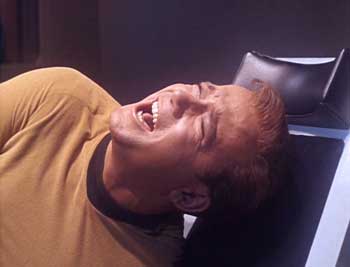
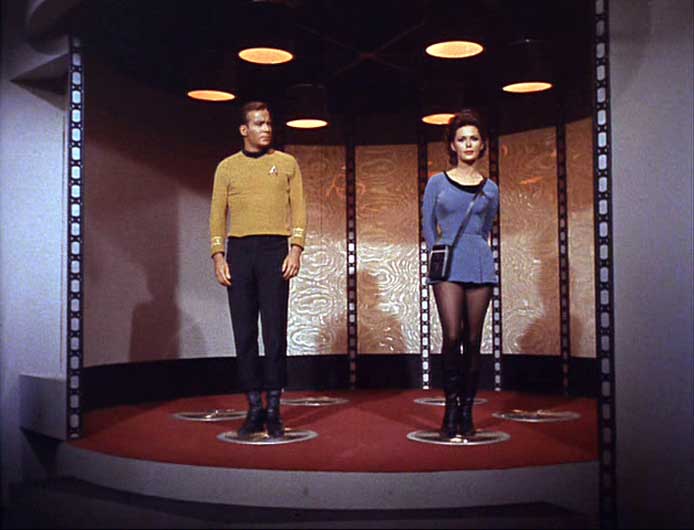
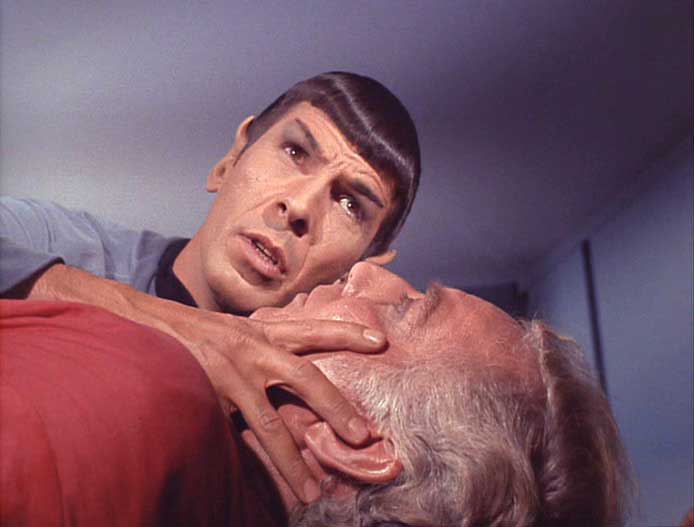
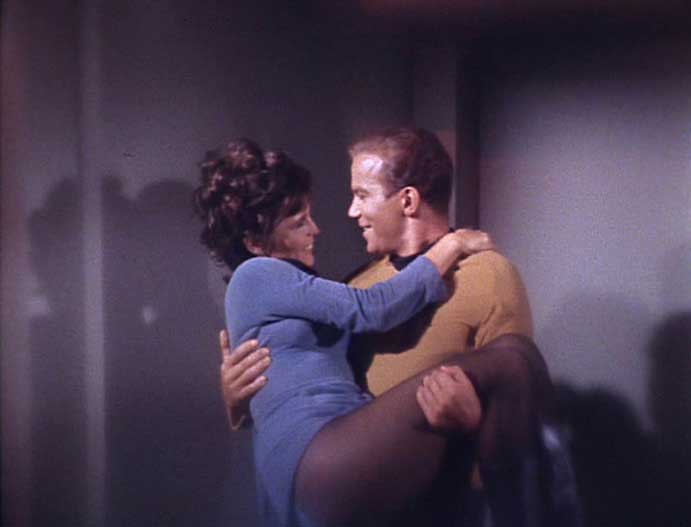
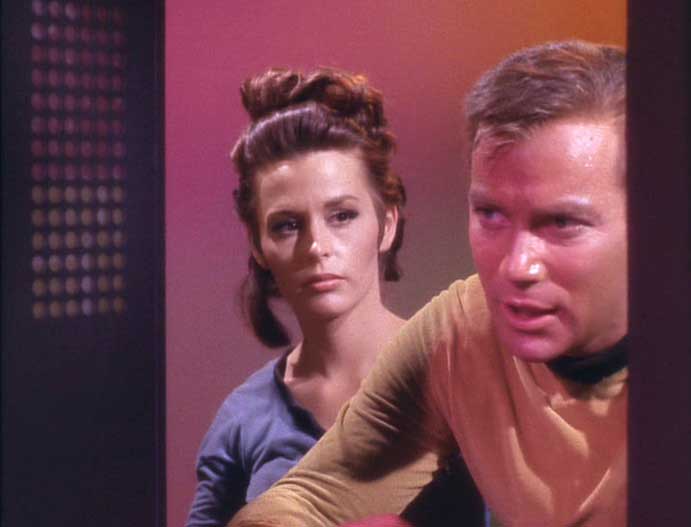
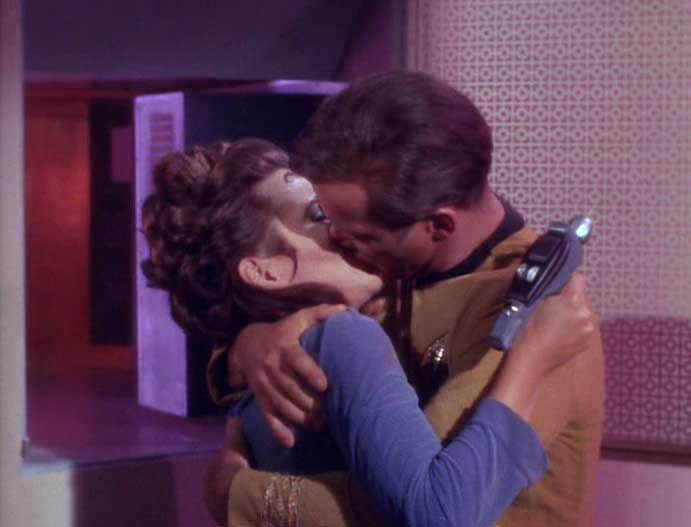
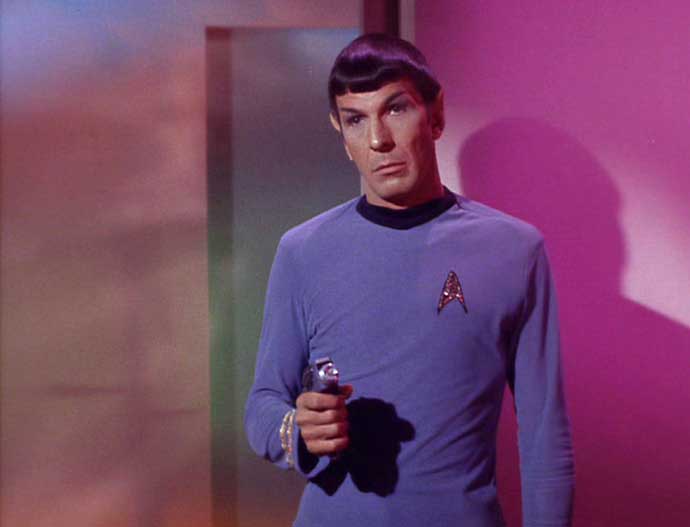
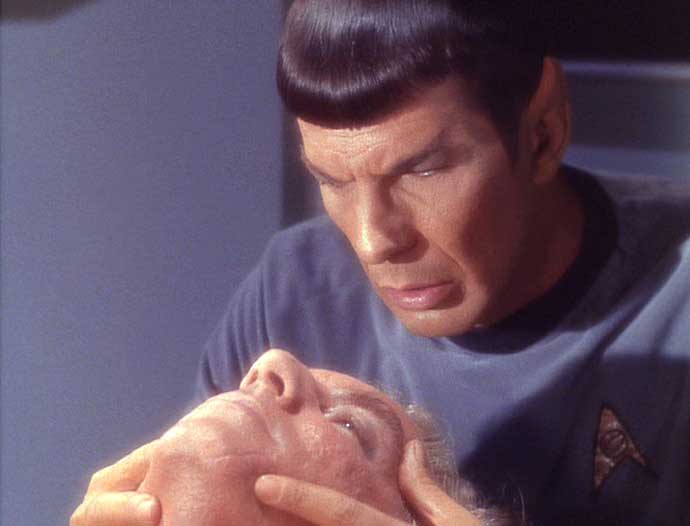
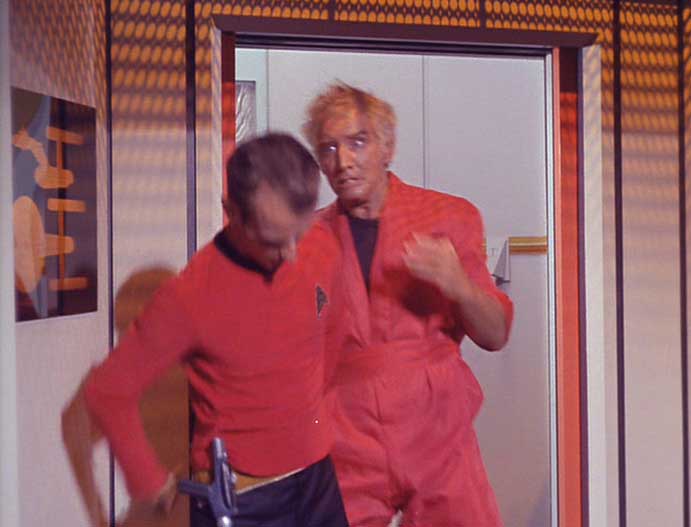
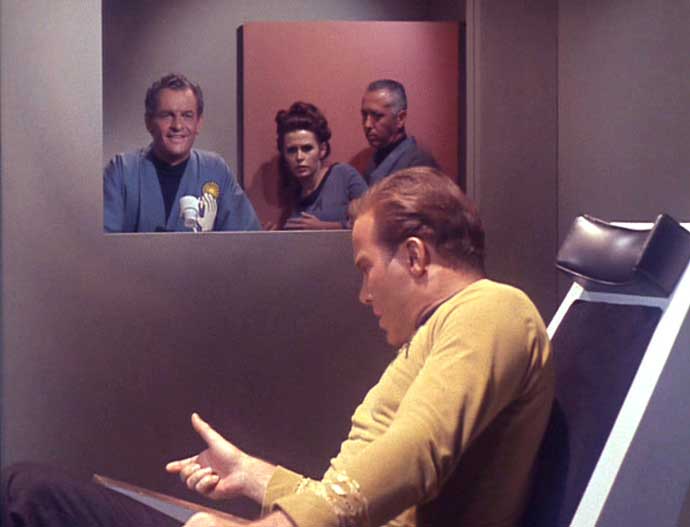
A warp factor rating of 4 is just right for this episode. The only scene I really enjoy watching is McCoy playing his Chief Medical Officer card on Kirk and making him investigate…
Isn’t there a Christmas reference in Voyager where Q turns Voyager into a Christmas ornament on a Christmas tree? Maybe I’m remembering that incorrectly.
Indeed, the Men in Black flashy thing is called the neuralizer, which could be short for neural neutralizer. (Though I’ve sometimes seen it spelled “neuralyzer,” suggesting “neural paralyzer.”)
This episode tends to be taken as one of the main examples of Kirk’s skirt-chasing personality, when in fact it’s one of the best pieces of proof that first-season Kirk wasn’t like that at all. A lot of people make the mistake of thinking that Kirk and Noel actually did sleep together after the Christmas party, when the whole point of Noel suggesting that fantasy is to propose a counterfactual, something that she and Kirk both know is untrue, so that they can be sure the neutralizer allows creating false memories. In reality, they just danced and flirted a bit, and Kirk is intensely embarrassed about the fact, suggesting that he’s not at all comfortable with the idea of romancing a member of his crew. Not only that, but even after Adams has programmed him to be desperately in love with Helen, he shakes off the suggestion with ease once she reminds him of his duty — and then makes the totally cold command decision to order Helen to risk her life in that conduit with live electric cables along the sides. Not the behavior of a hopeless romantic.
Overall, the episode never really did that much for me. Not a lot really happens, and what does happen is kind of unfocused. I hadn’t really considered Adams’s lack of motivation, but it might explain the sense that something’s missing from the story.
And yes, Noel implanting a sexual fantasy about herself in Kirk’s mind while he was under her care was grossly unprofessional. If a male therapist did that to a female patient, we’d see it as sexual harassment if not outright sexual assault — and it’s no less so when done by a female doctor to a male patient, despite our cultural double standard that says otherwise. (Whether Kirk was inappropriate to her at the Christmas party was unclear. All we know about the actual event, as opposed to the fantasy, is that they danced and Kirk talked about the stars, and that he was uneasy about it afterward.)
Also: How could Van Gelder get beamed up without anyone noticing? Transporters have sensors. The operator should’ve been able to detect that there was a human biosign inside the container. And the container couldn’t have been sensor-shielded, because if it had been, then the transporter wouldn’t have been able to scan the contents’ pattern for dematerialization and reassembly. This would make more sense if the crate had been brought up by shuttle, or if the transporter were some kind of wormhole-based instrument rather than a dematerialization-based one.
Fun fact: The mind meld debuts here, but the term “mind meld” is never used in this episode. The technique goes nameless here. Indeed, as far as I can tell, the term “mind meld” wasn’t coined until the third season, used only in “Spectre of the Gun” and “Elaan of Troyius.” It was called “the Vulcan mind probe” consistently in the second season (“The Changeling,” “By Any Other Name,” and “Patterns of Force”), as well as “mind touch” in “By Any Other Name,” “mind fusion” in “The Paradise Syndrome,” and “mind link” in “Is There In Truth No Beauty?” The animated series used “mind touch” exclusively (in “One of Our Planets is Missing” and “The Infinite Vulcan”). So it’s odd that “mind meld” ended up becoming the standard term when both “mind probe” and “mind touch” were used more often. I guess it’s because “meld” was used in The Search for Spock, for whatever reason.
@2/Glen – You are correct, that was in “Death Wish” – and lest I appear smart or anything, I looked it up in the Memory Alpha “Christmas” article. :)
My favorite thing about the superfast turbolift is how it magically flings Dr. Noel into Kirk’s arms. Where do I get this kind of elevator?!
This episode beautifully showcases one of my least favorite TOS tropes: Kirk-as-superhuman. He is always able to beat out whatever is trying to subdue him. Of course he can, he’s our hero…but I’d much rather Dr. Noel have been the one to break free and phone home, rather than Kirk resisting the neutralizer enough to pull out and operate his communicator even as Adams was upping the intensity. John Shelton Lawrence and Robert Jewett have written on heroes and monomyths, and include Kirk as an example of the American superhero – “like a true superhero [he] regularly escapes after risking battle with monsters or enemy spaceships.” And so the neutralizer is no match for Our Hero Kirk! He fights it to make the phone call, he fights it when it’s threatening to bleed his brain out his ears…another device/monster/alien vanquished! Yes, it took Dr. Noel turning off the power to do it, but those shots of him struggling with his communicator, dancing in/around the chair…he is fighting! He is our hero! Meh, not a fan, I.
Thank you for the rewatch! Thank you especially for pointing out how capable Noel is. It would have been great if she had stayed as a recurring character.
Yes, the plot is a mess. But disregarding plot (I know it’s difficult to disregard plot), I like this episode a lot. It makes me wonder if Adams really invented a great new method of treating criminals, or if his methods have been questionable all the time, and nobody looked too closely because it’s just criminals, so who cares? That Kirk holds him in such high regard makes it kind of poetic justice that he ends up on the chair (evil, excessive poetic justice, but still).
I also liked it that Kirk let go of his phaser immediately when told to do so but held onto his communicator to the end.
I actually liked this one a bit better than the previous one. At least, the concept of mind control on a penal colony has the potential to be a good story. At least, we get the first portrayal of the Vulcan mind-meld, thanks to Nimoy’s commitment to provide more depth to Spock. I also felt this was actually quite violent by 1966 standards, at least as far as the opening teaser is concerned (good to mention the incompetent security guards nevertheless).
While the idea of a psychiatrist character like Noel has its merits, the script seems like it was designed to jumpstart a Kirk/Janice Rand romance instead. The whole Noel/Kirk dynamic resembles what we’ve seen in these early episodes with them. If anything, I get the feeling Grace was written out of this one due to her increasing problems with the production at that point, and Noel came in as a replacement.
Supposedly – and specifically because of Marianna Hill’s increased presence – this was the episode that drove Nichelle Nichols to quit her job as Uhura before Martin Luther King convinced her otherwise.
@4/MeredithP: As I just wrote, I liked the bit about the communicator. I didn’t think he was depicted as a superhuman – after all, trying to call the Enterprise wasn’t very smart because the colony was shielded, so I took the scene to mean that communications with the Enterprise was much more important to him than his weapon, and that people can resist (up to a point) if something is really important to them. Van Gelder also claimed that he resisted at first, so that’s not something unique to Kirk.
Van Gelder’s rather spastic mental state gave me the serious creeps as a kid, understanding that he was in agony just from trying to say what he knew.
Adam’s lack of motivation, was this that common with sixties villains of the week? They don’t even bother to give him a stupid reason for doing all this. It makes it seem like the writers had the idea for the neural neutralizer and did not know how to justify its use. Like Raiders of the Lost Ark, this episode is ruined.
What kind of sucky job is being bridge security, since SOP apparently is to stand with your back to the only regularly used entrance to the room?
And lastly, the second episode in a row with a very beautiful female guest star. Dr. Noel certainly does the blue mini-dress justice.
OK, the captchas are really weird now.
@6/Eduardo Jencarelli: You’re right, the script was originally meant for Kirk and Rand. But the producers didn’t want to “jumpstart” a romance between them. Continuity was a no-no in ’60s TV, so the status quo between Kirk and Rand had to remain at the level of vague flirtation; he could only actually fall in love with guest stars. Also, Grace Lee Whitney was on the verge of leaving anyway.
Also, apparently the final draft script established that Kirk flirted with Helen at the party because he thought she was a passenger rather than a member of his crew. Which explains a lot.
@8/Crusader 75: The final draft also contains a scene that provides a motivation for Adams. Though basically he’s just gotten tired of being a humanitarian helping others and is now getting off on the power the neural neutralizer gives him over other people’s minds, power he intends to use to benefit himself. I’m not quite sure how reprogramming inmates’ memories translates to “a very comfortable old age… on my terms,” but that’s what the script said.
@7/JanaJansen – It’s a pattern, though, that’s well-demonstrated here…there are many instances throughout the series of Kirk being the only one to manage something. I haven’t seen “The Gamesters of Triskelion” in a while, but I seem to recall it’s loaded with Kirk-as-superhuman. Not in the sense of Khan’s gang or Gary Mitchell, but just being our hero! all the time…I’ll have to see what other examples I can come up with.
@8/Crusader 75 – When Dr. Noel showed up, my wife kept commenting on how short her skirt was. “Her ass is just hanging out!”
@10/MeredithP: But in ’60s TV, it was normal for there to be one central lead character, maybe two, who did all the heroics. Ensemble shows existed (e.g. Mission: Impossible), but they weren’t that common, and TOS wasn’t one of them. The first-season opening credits make that clear: The only stars of the show were Shatner and Nimoy. Everyone else was subordinate. Originally, Kirk was the star and Spock was second in importance — or perhaps third after the guest star of the week, since ’60s TV was often guest star-driven — but then Spock skyrocketed in popularity and it was a struggle for the producers to keep Kirk equal in importance rather than letting Spock take over entirely.
So I don’t see what’s so surprising about Kirk being the one to save the day. He was the hero of the show — it’s what he was supposed to do. It’s no different from the way countless other shows of the era were written. Batman and Robin almost always saved themselves; the police were next to useless. Jim West and Artemus Gordon, Napoleon Solo and Illya Kuryakin, John Steed and Emma Peel, Alexander Scott and Kelly Robinson — they were the heroes who always saved the day. Not to mention solo heroes later on like Steve Austin, Jaime Summers, Sam McCloud, MacGyver, etc.
@10/MeredithP: I agree that there are episodes with Kirk-as-superhuman, and “The Gamesters of Triskelion” is an especially stupid example. It’s a stupid episode anyway.
But I don’t see it in this episode except in the scene where he comes to after his second “treatment” and immediately fights Adams and the other guy. He doesn’t walk willingly into danger here as in “Where No Man Has Gone Before”, he’s not the only one who has ideas, he doesn’t really do much in this episode, and he still suffers from his experience in the final scene, which also makes him more human than superhuman.
“When Van Gelder calls at the very end, […] Spock, for some reason, relays the actual message”:
Spock is Kirk’s friend, and he knows that this message is important for Kirk’s emotional well-being. By relaying the message himself instead of leaving the task to Uhura, he makes it more personal and tells Kirk that he sympathizes with him.
Come to think of it, Spock’s social skills were quite good even in the first season.
JanaJensen: that is a nice rationalization, but it’s basically yet another marginalizing of Uhura so Spock can get more lines. The early episodes of the show were very good at showing that there were 430 people on the ship with jobs to do. The last few have all been about Kirk and Spock and the guest stars of the week.
—Keith R.A. DeCandido
Yes, it’s a shame that the crew became so unimportant after the first few episodes. But it was sweet of Spock to relay the message, and I think it was intended as such by the writers. Anyway, it’s more difficult to involve the crew when most of the action takes place on the planet of the week, so let’s see how “The Conscience of the King” turns out.
I watched this episode several years ago when the SciFi channel was reshowing TOS as originally aired. Shortly after that, I suffered a stroke and had an MRI while being diagnosed. The fogginess of my brain made me associate the neural neutralizer with the MRI. To this day, I can’t see this show mentioned without those thoughts coming back.
Ok, I don’t usually indulge my inner male chauvinist drooling fanboy — because, y’know, Trek wants us to be better than that (or at least, I suppose, to be equal opportunity about that) — but I, too, think Dr. Noel is drop-dead gorgeous.
And, yes, as has been pointed out above, she is a competent professional (apart from the contrafactual she chooses, per other discussions above). No wonder Nichelle Nichols was angry: she’s another beautiful woman, and not a one-shot guest star, reduced to being a glorified telephone operator. One of the best things Trek 09 did was give us an Uhura who was a smart and lovely true professional (I think STID undoes that to some extent, even though she gets to speak Klingon, by having her insist on hashing things out with her boyfriend in the middle of a very tense mission… oh, well.)
I grant all the logical problems pointed out with this episode already, but I’ve always liked it. It’s a good adventure story, with some very entertaining and intriguing performances — I have always felt so sad for poor Lethe — and Nimoy’s introduction of the mind meld is a real highlight. The deliberate choices he makes in that scene — his intonation, his hand movements, his timing — it’s all just so compelling. It’s unfortunate but inevitable, I suppose, that the mind meld became a ready stand-by; I like the reluctance with which Spock decides to use it in this episode, and the air of mystery that surrounds it, on a level with pon farr: “It’s a hidden, personal thing to the Vulcan people, part of our private lives.” (Flash forward to Trek 09, where Spock Prime just slaps his hands on Young Kirk’s face in the interest of time/infodumping… ok, I’ll buy Spock Prime is feeling some urgency, but how far we’ve moved away from the original concept!)
I think Dr. Adams’ fate at the end is a good conclusion, actually, as well as having Van Gelder put in charge of the facility. Heapin’ helpings of poetic justice all around.
@17/MikePoteet: Off-topic, I know, but I don’t think Uhura was just “hashing it out with her boyfriend” at that point — she was trying to get Spock to confront his self-destructive behavior resulting from his grief at the loss of his planet and his mother. She was concerned that he was going to get himself killed on a mission, and since they were going into a dangerous mission at the time, it was a valid issue for her to bring up. It wasn’t just about hurt feelings or self-absorption. So I don’t think it undermined her as a character.
And the “Spock Prime” who melded with Kirk was the same individual as the Spock in this episode (allowing for the odd katra transfer and bodily regeneration), but with about twelve decades’ more life experience behind him. By that point, he’d used melds often enough in the line of duty that he’d overcome the reluctance that his younger self had here. It’s always easier after the first time. Not to mention that it was Kirk, someone he’d melded with before and was very close to, at least from his perspective.
What’s always struck me as a bit hard to reconcile is that Spock evidently managed to get through at least 13 previous years in Starfleet without ever having occasion to engage in a mind meld/probe/touch/link/fusion with a human.
Also, it’s not chauvinistic to admire a woman’s beauty. What’s chauvinistic is ignoring everything else about her. We couldn’t reproduce the species if we weren’t allowed to be attracted to each other, so I really wish we would stop stigmatizing the simple act of admiring someone’s appearance. It’s perfectly healthy, so long as it’s done in a context of respect.
@18/Christopher: I like your interpretation of that scene in STID, but it hasn’t ever played like that to me. I’ve seen the film three times, and each time she really seems, to me, more motivated by her anger at Spock. Yes, there’s concern for him, too; but it’s more a matter of timing. That time is not the time for the two of them to be having that conversation. They are on the job, in their workplace. It’s unprofessional. Again, in my opinion. (Doesn’t Kirk even say something to the effect of, “Guys? Now? Really?” And he’s their CO!)
I will gladly, however, buy your argument about Spock Prime having grown older and wiser about knowing when and how to use mind melds. I’d also add as a friendly amendment that, by your own logic, it’s supremely easy to believe that Spock went 13 years before melding with a human. Maybe the younger, more immature, less self-assured Spock — who smiled at singing plants and shouted about missing women — simply removed himself from situations when it might have come up, or never volunteered that Vulcans could do such a thing (since, if memory serves, it is news to McCoy here in “Dagger”). Your comments, combined with his home planet’s penchant for secrecy, make it only logical (to coin a phrase).
(And I of course agree with you on the question of admiring people’s physical attractiveness, as I hope my prefatory remarks indicated.)
EDIT: Looking back, I see that my use of the word “too” could be taken to mean I thought others who admired her were being “drooling fanboys.” Such was certainly not my intent, so I apologize if anyone took offense. That’s the dangers of not having body language and tone of voice on teh Internets…!
@11/Christopher – Oh, I didn’t say I was surprised, not in the least. I understand why it’s there. I just said I didn’t like it…
@12/Jana – Okay, glad my Kirk-as-superhuman concept is at least getting across! I was a little addlepated yesterday and didn’t think I was explaining myself well. As I’ve always said, I’m fine with disagreeing whether this episode is an example of it. I just wasn’t sure I was even making my point clearly, so thank you.
@9 – That provides a satisfying answer about why Kirk flirted with Noel at the Christmas party and why he was so terribly embarrassed about it in the episode.
@10 It was? I am sure I did not notice anything like that (whistles innocently).
@17 Trek wants us to be better than that, are you sure? I had Roddenberry’s album where he stated he would continue to use women as sex objects, but would also use men as sex objects to be fair as he found being used as a sex object “great fun” (I am not sure what my parents were thinking letting me have that).
@18 It seemed to me that Spock Prime had some difficulty in keeping that Kirk separate from Kirk Prime (despite the two Kirk having significantly different childhoods). He approached the meld with Kirk as if it was his old friend. Also, Spock conveniently missed situations where a mind meld would have bee useful the same way Data served over a decade in Starfleet prior to coming aboard Enterprise-D without ever having his legal status as a person affirmed.
@20/MeredithP: Great, let’s disagree some more in the next weeks!
I actually like a bit of heroics every now and then as long as it’s not overdone and the heroes still come across as believable people. But there will be episodes where it’s definitely overdone.
…and we get to see the “neural neutralizer” again in the fried egg alien episode! Lol
Here’s a neat little tidbit… in Greek Mythology, Lethe is the “river of forgetfulness”.
@18: You’re absolutely right in that the problem is reducing a person to only their physical appearance, and ignoring all else about them, i.e., their “personhood.” But I don’t think we necessarily need to refuse to be cautious about such statements, because we live in a society where women are continually reduced to their appearance/body parts. So when comments pointing out a woman’s physical attractiveness are made out of context on the internet, it could be very well true that the commenter DOES respect the other qualities of that woman. But it also sends up a red flag, because it is a comment that is highly correlated with the culture that doesn’t respect women, and it elicits a ‘danger warning’ type of response. It can also raise the question of why the commenter went out of their way to mention that particular feature, especially in instances where nothing else about the character is mentioned.
We also have to keep aware that in this society, many women struggle with harmful body image issues, and this comes from comparing themselves to other women. Many women keep silent about these struggles and keep them to themselves. So sometimes we might be able to consider whether we have to leave a comment, or if we can leave out some of the things we’re thinking for the sake of sensitivity.
In any case, I think MikePoteet @17 was attempting to illustrate the “context of respect” that you speak of in 18. He was saying he was aware that the statement might be controversial, and he didn’t intend it as such. My point in the preceding paragraphs is that when a comment like that is left on its own, the context of respect is not immediately conveyed.
A person’s physical attractiveness is probably the first thing we attend to, because it is so readily apparent and is connected to an emotional instinct. It takes more time to cognitively assess the other qualities of a person’s personhood. But in terms internet comments, we should be able to assess whether the physical attractiveness is at the top of the commenting priorities, especially when we can guess that many others feel the same way. I’m not saying those comments CAN’T be made, but I think it’s important to make sure that context of respect is understood, because it’s NOT implicit in the society we live in. And I think that’s what MikePoteet was trying to do, so I don’t think we should call him out for that.
@21/Crusader – Right, that’s why I also said, “or at least equal opportunity.” I remember Roddenberry making such comments as late as the advent of TNG (hence, men wearing skants in the first few episodes – or maybe just the first!).
@25/crzydroid – Yes. We reach. :)
Returning to the matter of Dr. Adams’ motive: Why isn’t “because he can” motive enough? This is how such things happen in real life, too much of the time. People in positions of power and authority abuse those under them for a variety of reasons, some conscious, some not, but it also involves a large amount of, “Because I can.” Does Adams need a bigger motive, a grander scheme, a la Roger Korby, for this to be a successfully dramatic story? I don’t think so. He’s an abuser, and his patients are his victims, and it’s got to be stopped.
“Binky-bonkers” had me laughing. I can say for a fact that Star Trek had me watching more wild 50’s to 70’s (and sometimes even 80’s) movies and television for actors that appeared on it, such as ‘binky-bonkers” Morgan Woodward. Was he great or what? All I can say is that Morgan Woodward makes everything better, even this particular mess of an episode. Honestly, the best thing about it was the early SOUTH PARK tale that riffed on Van Gelder and many, many other facets to make me laugh for 30 minutes.
Keith, I can’t wait until you get to “The Omega Glory”, which entertains me to no end, regardless of how improbable the tale may be.
@25/crzydroid: You’re right, of course, about the ways in which certain jerks have corrupted the healthy process of sexual attraction into something demeaning and abusive, and I’m certainly not insensitive to that. I just think it’s sad that they’ve ruined it for the rest of us, and I wish we could hurry up and eliminate those sexist idiots once and for all (well, not kill them off or anything, just get rid of their attitudes) and create a world where equality and respect are givens, so that we no longer have to be embarrassed about thinking other people are nice-looking. And, of course, for lots of other good and far more important reasons. But that one too.
@26/MikePoteet: I think the issue about Adams’s motive is that it’s hard to reconcile his seemingly arbitrary evilness with Kirk’s perception of him as this great, near-saintly figure. The deleted scene helps explain that: He did indeed do a lot of selfless, benevolent stuff in his career, but then he got tired of placing others before himself.
@28/Christopher: Concerning Adams’ motives – it’s not just about serving his own interests for a change, don’t you think so? He obviously enjoys himself during the second “treatment”.
@29/JanaJansen: I don’t see the distinction. Enjoying himself at others’ expense is the whole thing he wants to do. He’s tired of being the nice, selfless guy and has embraced the power-mad, sadistic jerk within. It’s not really that uncommon a motivation for fictional evildoers.
@30/Christopher: I thought you referred to the “comfortable old age” aspect of the deleted scene here (by the way, the link you provided doesn’t work). But then, you wrote yourself that it doesn’t quite fit together. Of course I agree that following one’s pleasure also counts as not placing others before oneself.
@31/Jana: “Comfortable old age” is villain shorthand for “I want wealth and power.” It’s all part and parcel of the same thing: The character who’s sick of making personal sacrifices on others’ behalf, has grown bitter, and now takes pleasure in taking from others and making them sacrifice on his behalf.
As for the link, I tried to fix it, but for some reason Tor.com is converting the equals signs in the address to commas. One more thing we can blame on the disastrous “upgrade,” I suppose. Try manually replacing the two commas with equals signs in your browser address bar, and it should work.
Helen is the most compelling character in this episode. In the context of the 1960’s she’s got some superheroic qualities of her own. She’s Kirk’s female parallel — she’s a distinguished doctor AND she’s hot and pulls off the blue miniskirt! She can operate the neural neutralizer AND she can crawl through dangerous electrical ducts and beat up a dude! When Kirk plays the damsel in distress role she comes to the rescue and saves the day, but she has a little bit of fun in her by programming her little tete á tete with Kirk into something just a little bit more. Wishful thinking? I so wanted her to have more of a relationship with Kirk Too bad for the no continuity rule. No wonder she jammed to the Reliant after the episode! Imagine — I’m pretty sure neither she nor Kirk would have been willing to go back under the neura neutralizer after the incident so they would both have been walking around with these memories, in Kirk’s case somewhat more intense and false to boot. Running into each other in the lift would have been a little awkward…
@32/Christopher: I got the “wealth” part, but not the rest. And thanks for the information concerning the link!
@33/Mpawong1968: Yes, they would have made a great couple. But she’s in his crew, so it can’t be.
Keith: I just remembered that Adams and the neural neutralizer are mentioned in Judy Klass’ novel “The Cry of the Onlies”, where a modified version of the neutralizer is used on the children from “Miri”.
I finally got around to reading the deleted scene Christopher mentioned in @9 (again, thank you for the link, it worked now), and I’m glad it got deleted, for several reasons.
First, it’s annoying when the villain explains his plans or motivations at length to the hero.
Second, after what we’ve seen of the neual neutralizer, Kirk shouldn’t be able to have a conversation. Repeating Adams’ words, or calling the Enterprise with the same words he always uses is something else, but coming up with new thoughts and sentences of his own doesn’t fit with the idea of a “blank mind”.
Third, and most important, the notion that Adams used to do great, selfless deeds in the past makes the episode less interesting (for me). One of the best things about the episode IMO was that it’s nicely ambiguous concerning Adams’ prior achievements. I’m very uncomfortable with the concept of erasing a personl’s memory as part of the rehabilitation process, and it seems that Adams did that prior to his experimentation with the neural neutralizer, because Noel knows about it and agrees with it.
So, its seems that he erased people’s minds and changed their personalities, and everyone applauded him. This is scary, and it also makes it easy to imagine his descent into villainy as a gradual process: First he invents the neural neutralizer to do what he does anyway more efficiently. Then maybe he finds out that he enjoys emotionally torturing his subjects by suggesting feelings of loneliness etc., and nobody cares because he’s a world-famous humanitarian, and they are mere criminals. Then this new assistant Van Gelder turns up, and he does care and makes trouble, so why not erase his mind to solve the problem, if that’s what Adams does anyway? Only that Van Gelder resists and ends up not as an obedient zombie, but as a near-madman. Next this starship captain comes around who turns out to be an equally difficult case, so that’s a great opportunity to gain some more experience with difficult cases…
None of that is in the episode, I know, but it fits with the episode, and it doesn’t fit with the deleted scene.
@35/JanaJansen: Actually, there’s a lot of current research into memory suppression as a treatment for post-traumatic stress. The idea is that if you can interrupt the long-term memory storage of traumatic events, it will keep people from suffering long-term psychological stress or behavioral disorders as a result. So if it were done with the consent of the patient, rather than coercively, it could be beneficial in a number of ways. Of course the potential for abuse exists, but that doesn’t mean it can never be used positively, just that its use needs ethical oversight. If anything, the problem was that Adams was out on the frontier, able to operate Tantalus as his own personal fiefdom without having to answer to review boards or the like.
@36: Reminds me of Marty in “Wormhole X-treme!”
At least this episode gave us the planet’arium episode of South Park.
Because of the holiday weekend, I’m running a bit behind, but “Miri” will go up tomorrow.
—Keith R.A. DeCandido
Just as an FYI – Tacking into the Wind review from DS9 is showing on the TOS main review page for me,
Looking forward to “Miri” – BONK BONK!
Can also confirm “Tacking Into the Wind” is showing up as a pre-“The Cage” episode.
So, do you think that the Australian-like accent of the Tantalus Colony communication officer at the beginning was a deliberate play on Australia as an old penal colony?
“Find me someone with psychiatric and penology experience.” Penology? Is that even a word?
@41/Artsapat: Yes, it is. Although in the context of the sentence, “penological” would’ve been more grammatical.
Isn’t there a line by Van Gelder, “…Dr. Adams…was destroyed…by……death!”. Did I mis-remember this? (I threw out our family neural neutralyser a few years back).
Perhaps Dr. Adams was never there. (Apologies to Roger Corby).
Thoughts?
@43/JGirv: Van Gelder is a bit difficult to understand, but according to my DVD subtitles what he says is: “Dr. Adams will destroy… like death.”
Sorry, no androids this week…
@43/44: I’ve always interpreted Van Gelder’s line as “Bright death,” a reference to the neural neutralizer light. But apparently the scripted line is “Like death.” As in, what the neutralizer does to you is like a living death.
@41. I had the same thought about the Australian accent.
Why does Kirk have such a hard-on for penal colonies and corrections procedures? He goes out of his way to mention it at least 3 times in the first 10 minutes.
Also very much agree with the insight about Adams’ lack of apparent motive being a big hole in this one. He doesn’t even seem particularly upset when his dastardly deeds are revealed. How did he think he was going to get away with frying Kirk’s mind when he already knew he was under suspicion by the officers on the Enterprise? “He’s eeeeeevil” just isn’t good enought.
@46/JohnC: “He doesn’t even seem particularly upset when his dastardly deeds are revealed.” – Why would he be upset? I think he saw it coming. The first thing that goes wrong is Van Gelder’s escape. He tries to talk his way out of that, but to no avail – the Enterprise sends an investigation team. He tries to allay their doubts, but that doesn’t work either – they decide to stay overnight. At this point, he probably expects trouble and makes his entrance at the best possible moment, when Kirk is already under the influence of the neural neutralizer.
Which brings me to the next point:
“How did he think he was going to get away with frying Kirk’s mind when he already knew he was under suspicion by the officers on the Enterprise?” – What else could he have done? After his efforts at persuasion have failed, and Kirk and Noel know what’s going on, his best chance is driving Kirk mad and afterwards brainwashing Noel into testifying that it was another accident.
The way I see it, Adams wanted to conduct research on humans without being bothered by ethical boundaries. Perhaps he also likes to hurt or at least control people. He’s like a concentration camp doctor.
@47 Yeah, classic sunk cost fallacy at ply. He is either arrogant enough that he thinks he can work a way out of it if he keeps trying, or he is just desperate enough that he keeps on digging his hole in the hope that is works out, but whichever it is he just cannot bring himself to give up and admit that the jig is up. Either way it is a depressingly human, believable, and realistic thing to do. Digging your own hole in the belief that you can make it work out or that you just hope that it will is behind 99% of all bad decisions ever made. Just this one involved a guy who was super arrogant, had been too long outside any normal checks on his behavior/power and has long since left sanity behind in his belief in his own sense of rightness.
At the end of the episode Kirk asks, “Can you imagine a mind emptied by that thing?” It’s a philosophical question Kirk asks upon seeing Adams has died from an empty mind.
Imagine noting? Sort of a Heisenburg uncertainty principle: Imagining it makes it impossible to know because in doing so it becomes something.
One of my favorite episodes. The neural-neutralizer is one of the more frightening inventions of Trek. Also Dr. Adams is one of the most underrated villains. Easy to get lost in the shuffle of Khan and others. But doctors who abused their position to perform sadistic experiments is a very real thing(Dr. Mengele anyone)?
Too bad Marianne Hill’s Dr. Noel character never was seen again, she really was a strong female character so early in Trek. Very rare.
So, it looks like the character of Lethe is actually going to be Admiral Cornwell of Star Trek Discovery…
It’s a theory, but it doesn’t have any actual basis.
@51/Electone: What? That’s a nonsensical idea. Lethe is the river of forgetfulness in Greek myth. The Lethe character in “Dagger of the Mind” was named as a symbolic allusion because she’d lost her memory. And “Lethe,” one of the several Discovery epsiodes that Admiral Cornwell is in, was named for the same myth because it’s also about memory and oblivion. That’s the only connection.
This whole episode points out the truth of the statement that “absolute power corrupts absolutely.” It also reminds me of a statement Sherlock Holmes made in one of his cases: “When a doctor goes wrong, he is the first of criminals.” I find it fascinating, how both these statements seem to go hand-in-glove. I was also intrigued no end by the scene where Spock performs a mind-meld for the first time on a human; a lot of credit must go to Dr. McCoy who pushed him with the urgent question “Will it work or not?” It worked very well; Spock—even though he assured Bones that “it’s not hypnosis”—actually made use of two such suggestions, the first of well-being and relaxation, the second of zero gravity, weightless suspension. This combination certainly enabled him to push through the barrier that had kept Van Gelder from speaking out about what he had endured.. And finally, another phrase came to my mind—“hoist by his own petard” as a description and explanation of what happened to Dr.Adams. A good story all around.
Perhaps, Dr. Adams was a person with antisocial personality disorder, who rose to the top of his profession, in part, because he had APD. This might explain some of his unconscionable behavior in Dagger of the Mind.
I must say, for a funky rotating light in the ceiling, the Neutral Neutralizer was pretty terrifying. More so for me considering it gives me a headache when I watch this episode, hah.
Personally, I thought Adams death was delightfully satisfying. As Kirk mentioned, dying in complete and utter loneliness without even a tormenter for company sounded particularly brutal.
I agree with the consensus, the one thing this episode certainly is missing is any clear motivation for Adams behavior. The episode feels so incomplete without it. Aside from that, I think this is a good episode for what is explained and Gregory and Woodward are terrific.
@56/Thierafhal: If there’s one thing the news over the past few years (or even just the past 24 hours) has made repetitively clear, it’s that a lot of people don’t seem to need any specific motivation for being malicious jerks.
@57/ChristopherLBennet
I agree. Although as a piece of fiction, I still think it would have helped the story to have a motive. On the other hand, comparing apples to oranges, in the TNG episode Time Squared, I liked that the episode had no real answers.
Christopher: In real life, sure, but in fiction, things are supposed to make sense…………
—Keith R.A. DeCandido
Upon rewatching this episode today, I noticed something ridiculous. When Dr. Van Gelder storms the bridge, the security guard he knocks out is left laying on the deck. After Kirk and Spock manage to knock out Van Gelder, it’s already been at least 30 seconds. Everybody is so fixated on Van Gelder and not one person shows any concern whatsoever for the security guard. It’s like he’s a slab of meat or something. Hilariously, Uhura is barely a meter away while the guard remains down, at this point, for almost a minute. He’s only unconscious, but he could have been dead for all anyone knows! I mean I know he utterly failed at his job, but geeze louise! Err, Uhura!
So there are some logic gaps in this story and Adams’ evil motivation is never explained, but in spite of those things I still enjoyed this episode.
I find mind control and having your mind wiped or altered horrifying things so I was kept intrigued and on edge once we got down to the prison where everyone acts creepy and lobotomized.
Morgan Woodward is really effective at chewing the scenery here. No wonder this episode and Van Gelder were parodied on South Park.
Marianne Hill was lovely and I felt had amazing chemistry with Shatner. I liked that Kirk and Noel had a flirty but awkward history. Plus, her character was overall a competent professional and helps to save the day. Pity she wasn’t brought back than just used as a one-off beautiful love interest of the week for the captain .
And the look on Spock’s face when he walks in on the two of them smooching is priceless.
Because it’s so entertaining and I like the creepy premise I give this a 7.
‘Dagger of the Mind’ is a fine episode, but I have never understood just what compelled Dr Adams to turn “evil.” Was he evil to begin with and just masqueraded for years as a benevolent scientist who just wanted to help prisoners? Or was his intention always to inflict pain and suffering upon others? Another aspect that I always found strange – Kirk seemed to be surprised to see Dr Noel on the Enterprise crew? Isn’t he supposed to know all of his staff? Yes, I know he has more than 400 shipmates, but he should still be familiar with his underlings?
@62/Palash Ghosh: See comment #9 above for the answers to your questions (or rather, the answers that were in the script but were deleted from the final episode).
Just watched this episode again and I like it, but I’d completely forgotten that they never explained why Director Adams was misusing the neural neutralizer on his patents. I thought for sure there was an explanation and was curious as to what it was. But nope, nothing, which is a shame because I do love the “respected professional becomes a criminal or goes insane” trope but it doesn’t work when there’s no reason.
I read that there was a reason in the script–Adams was disgruntled that he wasn’t getting any monetary rewards for all his hard work but Roddenberry nixed that because he felt humans were above that sort of thing in the 23rd century. Me, I’m going to guess that he was bitter that his new ideas were being dismissed. I think he did truly try to argue that criminals should just forget about their past misdeeds and move on. The psychological community disagreed (and they should). So, I think he became bitter.
My only issue with Dr. Noel’s *ahem* interesting uniform – where are her stripes? In the modern US Navy (whose rank structure Starfleet is based on) doctors are commissioned as full Lieutenants or higher to reflect their medical training. I would hope Starfleet would do the same and not make Dr. Noel a lowly Ensign….